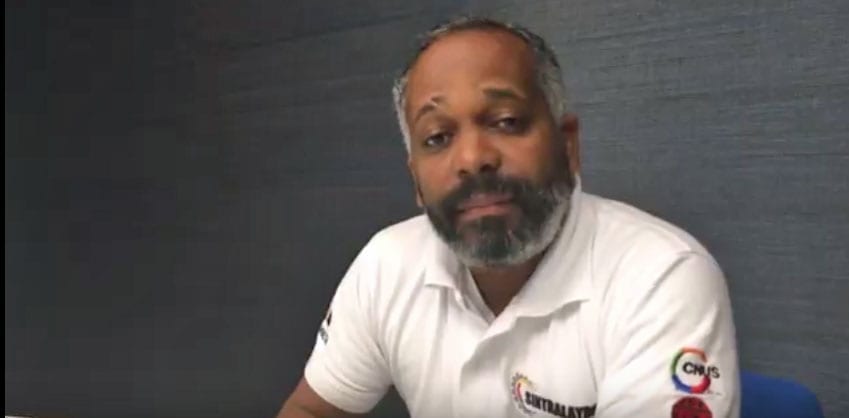
Jan 9, 2018
Ramon Alexander Mosquea Rosario, a union leader at Frito Lay/Pepsico worksites in the Dominican Republic, helped form the National Union of Workers of Dominican Frito Lay (SINTRALAYDO), despite nine years of employer harassment, firings and retaliation.
He encourages other workers to never give up their struggle.
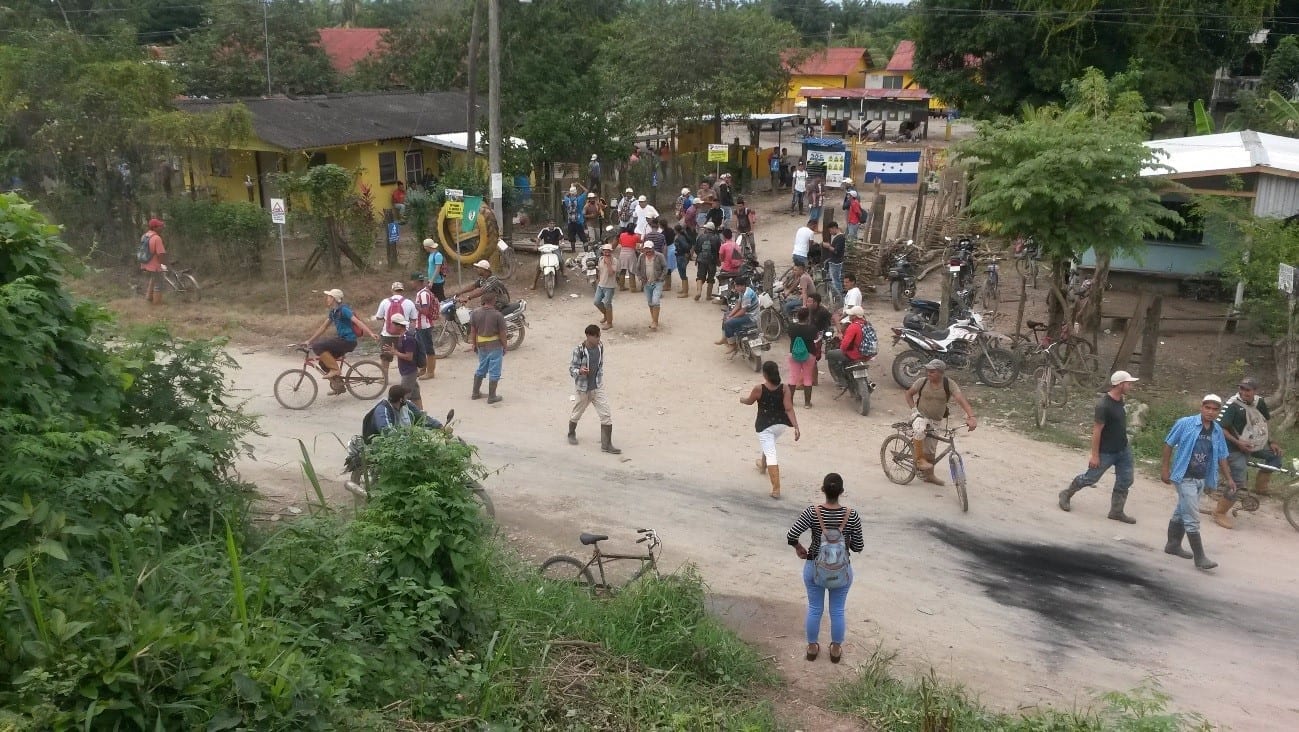
Dec 15, 2017
Several striking palm oil workers in Honduras were physically assaulted by private security guards and threatened with prison this week as they peacefully walked a picket line at company offices in El Progreso, according to the agro-industrial workers’ union federation FESTAGRO. The workers have been on strike since October, seeking to form a union in the face of stiff employer opposition.
Denouncing the attack, STAS, an agro-industrial union affiliated with FESTAGRO, says the company “is using violence to continue to violate the rights of workers” rather than initiate a serious dialogue.
The strike began October 20 when 160 palm oil workers walked off the job to protest the firing of 18 STAS-affiliated workers fired after workers indicated their intention to form a union. In early October, 80 palm oil workers had formed the country’s first-ever palm oil union, a move that sparked efforts by workers at other palm oil plantations to form unions.
The company went on to fire another 80 STAS-affiliated workers on November 2. Some 300 workers are now on strike and families are struggling to survive after nearly 70 days on the picket line.
According to FESTAGRO and the Honduran Network of Trade Unionists against Anti-Union Violence, after staff at a regional Ministry of Labor office conducted an inspection at the plantation in late November, a young FESTAGRO organizer was followed by a company vehicle when he later met with the Labor Ministry in the town of El Progreso.
Over the years, agro-industrial workers in the melon and banana sectors seeking to form unions with FESTAGRO, a longtime partner of the Solidarity Center, have been threatened, stalked and physically assaulted. The Anti-Union Violence Network, in which FESTAGRO is a key leader, also has documented murders of farm worker union activists, including those whose unions are members of the network.
The attack on the palm oil workers comes in the wake of violent repression against Hondurans protesting the country’s flawed elections. Honduran labor unions and human rights groups are demanding respect for human rights and transparency in the resolution of the country’s election crisis.
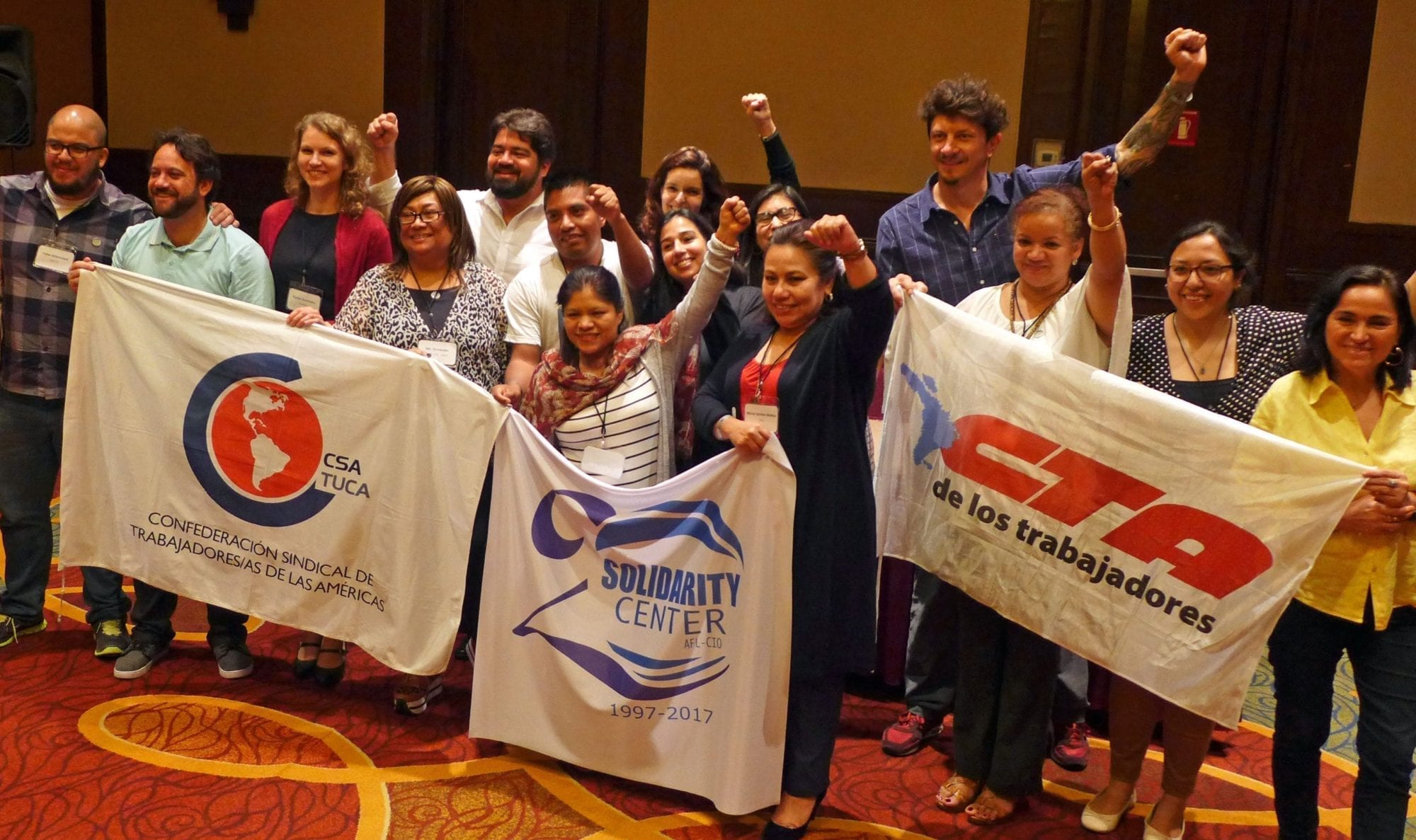
Dec 14, 2017
Protecting the rights of migrant workers must be an essential component of the United Nations Global Compact on Safe, Regular and Orderly Migration, according to union leaders who met recently in Puerto Vallarta, Mexico, to craft a worker rights agenda for inclusion in the global compact, the first inter-governmentally negotiated agreement to comprehensively cover all dimensions of international migration.
The December 1–2 meeting preceded a UN gathering to assess recommendations and discuss implementation of the global compact on migration. The 17 union leaders from across the Americas crafted a shared policy agenda and outlined plans to advocate within national and regional government bodies.
“It cannot be overstated how important the content of the compact will be in terms of creating policies that will affect economic inclusion,” says Neha Misra, Solidarity Center senior specialist for migration and trafficking. “This work will set the agenda for global action on migration and the role of displaced workers for at least the next decade. It is crucial that migrant workers, and the unions and worker centers that represent them, have a voice in the global compact negotiations process.”
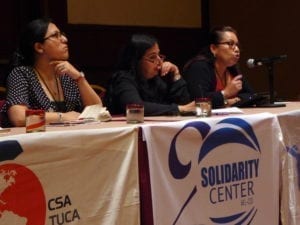
Elena Villafuerte, PRODESC; Neha Misra, Solidarity Center; and María Carmen Molina from CSTS in Mexico were among panelists presenting labor’s joint position on labor migration.
In a panel presentation sharing labor’s joint position with UN participants, María del Carmen Molina, general secretary of the Confederation of Salvadoran Workers (CSTS), stressed the importance of protecting all workers’ rights, regardless of immigration status, and the responsibility of governments to ensure conditions so migration is by choice, not compulsion.
Misra and Solidarity Center partners from the Central American Regional Union Committee on Migration (Comité Inter-Sindical), ProDESC and Centro de Derechos del Migrante in Mexico took part in the civil society meetings prior to the UN’s formal session, and presented their recommendations to the full UN meeting December 4–6.
Union leaders also emphasized the need to ensure accessible pathways to regularization to ensure full rights for the world’s 150 million are migrant workers, and end the global expansion of abusive and exploitative labor migration programs. They agreed to take the issue of migrant worker rights back to their respective labor bodies to continue to educate and advocate on the issue.
The UN process to develop the global compact for migration began in April 2017. The UN General Assembly will hold an intergovernmental conference on international migration in 2018 with a view to adopting the global compact. Following the UN meeting, participants issued a joint statement summarizing their suggestions for implementing the global compact.

Dec 8, 2017
Honduras remains without a president nearly two weeks after elections marred by allegations of fraud, street protests and their violent repression, and Honduran labor unions and human rights groups are demanding transparency in the resolution of the crisis and respect for human rights.
“We demand unrestricted respect for the popular will expressed at the polls by the Honduran people on November 26 in a peaceful manner,” said three union federations—the United Confederation of Honduran Workers (CUTH), General Workers’ Confederation (CGT) and General confederation of Workers (CTH)—in a joint statement.
The Electoral Observation Mission of the Organization of American States (OAS) to the elections in Honduras has reported that the “lack of guarantees and transparency, as well as the accumulation of irregularities, mistakes and systemic problems that have surrounded this electoral process during the pre-electoral phase, election day, and the post-electoral phase, that as a corollary do not allow the Mission to have certainty about the results.”
The OAS has demanded that the government lift its curfew and conduct an exhaustive investigation into allegations of fraud. The government has since cancelled curfews in eight of 18 Honduran departments. The national police on Monday refused to enforce the nighttime curfew that day.
The Committee of the Relatives of the Detained and Disappeared in Honduras (COFADEH), a human rights defense group, has detailed 14 deaths (including children), 51 people injured and 844 arrests in what begin as peaceful protests. Thirty-eight protests around the country were violently quelled through tear and pepper gas, and conventional weapons.
The Electoral Commission has said it would recount more than 4,700 ballot boxes. Argentina, Chile, Colombia, Guatemala, Mexico, Paraguay and Peru said they supported a full recount of the vote.
In a statement issued today, the AFL-CIO also called for a complete recount that “must be observed by all political parties, civil-society organizations and international observers, such as the OAS and European Union missions that have raised reasonable questions about the November 26th election, subsequent vote-counting process and violent repression of peaceful assembly and expression. Failing such a recount, Honduras must conduct a new election, after taking effective measures to address the grave problems seen in the recent election.”
U.S. civil-society organizations have also issues a statement calling for transparency and for “Honduran authorities to refrain from any actions that would limit the ability of the Honduran people, journalists and social communicators, social movements and civil-society organizations to freely express their opinions and exercise their right to freedom of association and peaceful protest.”
On November 28, the State Department cleared the way for the Honduran government to receive U.S. foreign assistance, certifying that the country is fighting corruption and protecting human rights.
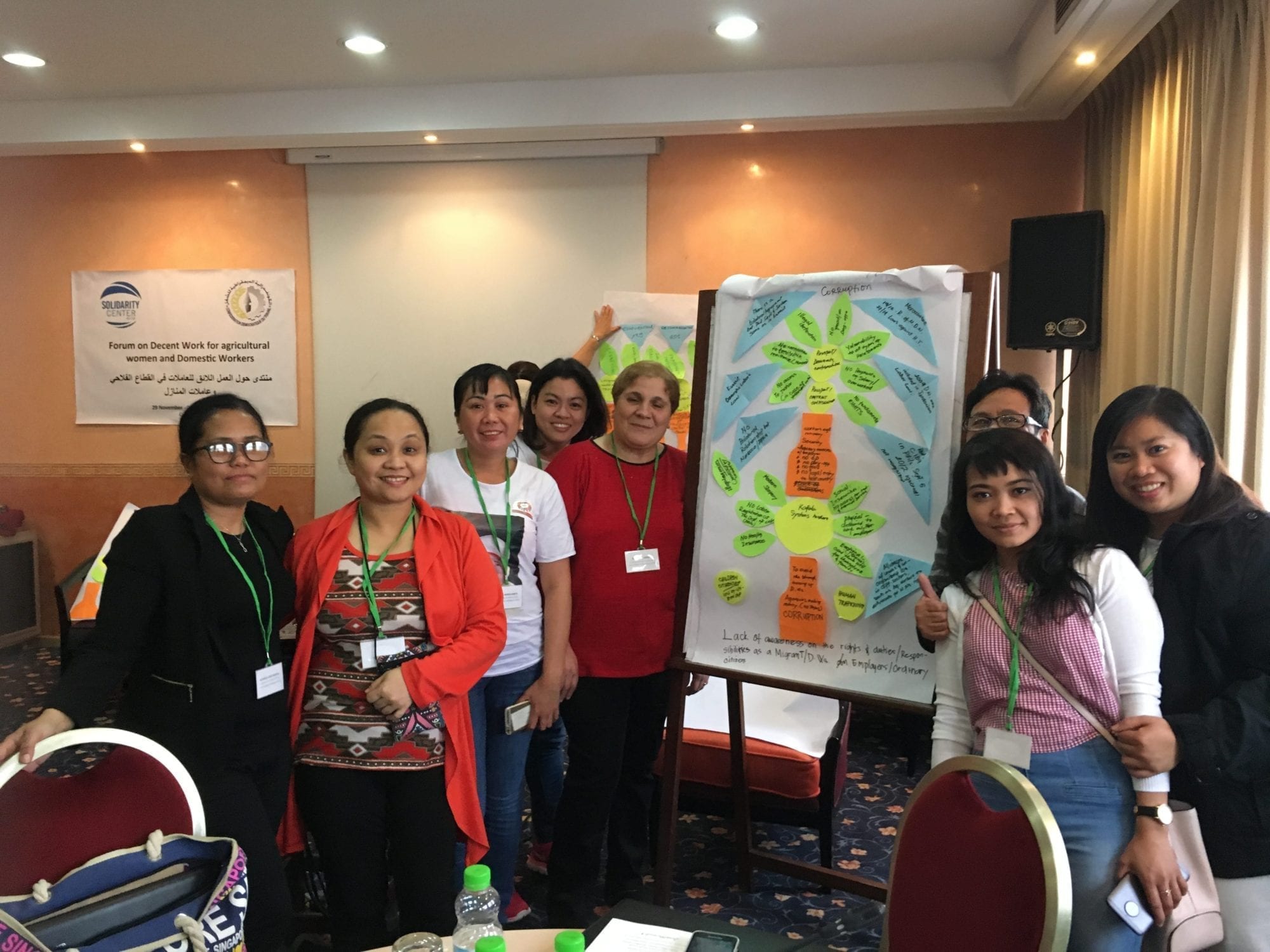
Nov 30, 2017
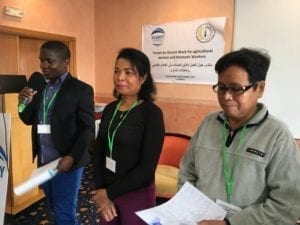
Romaric Hocine, Marie Constant and Adoracion Salvador Bunag shared domestic workers’ success stories. Credit: Solidarity Center/Tula Connell
Following heartfelt rounds of songs on workers’ struggles and union solidarity, some 30 worker rights advocates launched the second day of the Forum on Decent Work for Agricultural Women and Domestic Workers. Discussions centered on the lack of migrant worker rights and the commonalities between the treatment of domestic workers and farm workers, and participants concluded the day by sharing success stories and best practices from around the world.
The November 29–December 1 forum in Casablanca, sponsored by the Solidarity Center and the Democratic Labor Confederation (CDT) in Morocco, includes representatives of unions and worker associations from Jordan, Kuwait, Lebanon and Morocco.
“We have to be aware of all the different ways our employers and governments try to divide us from each other,” says Erin Radford, Solidarity Center senior program officer for North Africa, opening the conference with small group discussions.
In conversation with each other and together as a group, forum participants explored how migrant workers often are paid lower wages than a country’s standard minimum wage, are prohibited from forming unions and typically are not covered by basic social protections, like pensions. Gender also is a key dividing line at work, and participants shared how women are treated as lesser than men at work, even as they take on most of the care burden at home.
These divisions, says Radford, are how employers “can increase their control over workers and exploit them.”
‘Labor Is Not a Commodity’
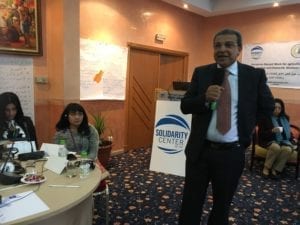
‘Labor is not a commodity’—Mohamed Korri, labor relations expert and former consultant in the agricultural sector. Credit: Solidarity Center/Tula Connell
Divisions in labor rights between farm workers and non-farm workers are especially acute in Morocco, says Mohamed Korri, a labor relations expert and former consultant in the agricultural sector. As part of a panel presentation with experts on decent work and migration, Korri listed the ways in which farm workers have fewer rights and protections than other workers: they are paid less than the standard minimum wage, they are not eligible for paid holidays and they face such strict pension restrictions they rarely qualify for paid retirement.
There is little incentive for legislators to improve the laws, he said, because many own farms and benefit from worker exploitation. “Labor is not a product, not a commodity and must be treated humanly,” he says.
Also on the panel, Bachir Znagui, a media professor from the HEM Research Center, overviewed the conditions of domestic workers and migrant workers in Morocco and the international conventions covering their rights, and shared best practices from countries around the world, including Uruguay, which requires labor inspections of the homes of those employing domestic workers.
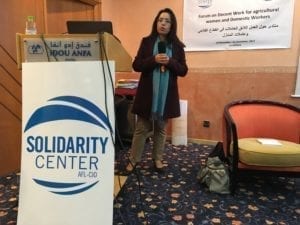
Freedom to form unions is a key pillar of decent work, says Fatima Idahmad, ILO representative in Morocco. Caption: Solidarity Center/Tula Connell
Znagui’s presentation showed that growing numbers of workers are forced out of formal-sector employment and into jobs with low wages and no social protections or job security—hitting women and migrant workers the hardest because they comprise the majority of workers in the informal economy. The increase in low-paying, temporary jobs is fueled by a rise of corporate rights and corresponding decrease in worker rights around the world.
Key to decent work is the freedom to form unions, the elimination of child labor and forced labor and the elimination of workplace discrimination, says Fatima Idahmad, national coordinator for the International Labor Organization (ILO) in Morocco. Idahmad highlighted how the ILO is raising awareness among workers about their rights throughout Morocco.
Strategies for Success
Working together—across organizations, job categories and countries—workers can push back against global corporate forces and unsupportive governments. And in sharing success stories, forum participants began crafting strategies to take back to their workplaces.
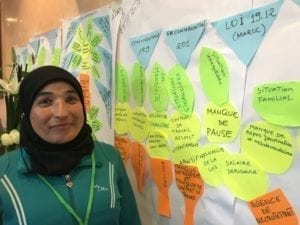
Farm worker and CDT member Hayat Khomsi says a union contract has completely transformed the conditions under which farm workers toil. Credit: Solidarity Center/Tula Connell
Marie Constant, a domestic worker in Lebanon originally from Madagascar, was among activists who led the formation a domestic workers’ union in that country, the first of its kind in the region. Constant described how union members, nearly all of whom are migrant workers, receive key support from National Federation of Employees’ and Workers’ Unions in Lebanon (FENASOL).
“Even if we know we have a long way to go, that there are a lot of hurdles along the way, we are advancing not regressing,” she says, speaking through a translator.
A union contract has completely transformed the conditions under which farm workers toil on Les Domaines Brahim Zniber farm, says Hayat Khomsi, a farm worker in Meknes El Hajeb and activist with the CDT.
Under the landmark 2015 agreement, which now covers 1,200 workers on six farms, workers for the first time have formal employment contracts with job security, paid leave and other social protections. Crucially, women now have equality with men, enabling the women farm workers, who previously were blocked from “male” jobs, like truck driving, access to these generally higher paying jobs.
“Now we have achieved a similar status to that of the men,” says Khomsi. “Now I am a team leader and before no woman could have been a team leader.”










